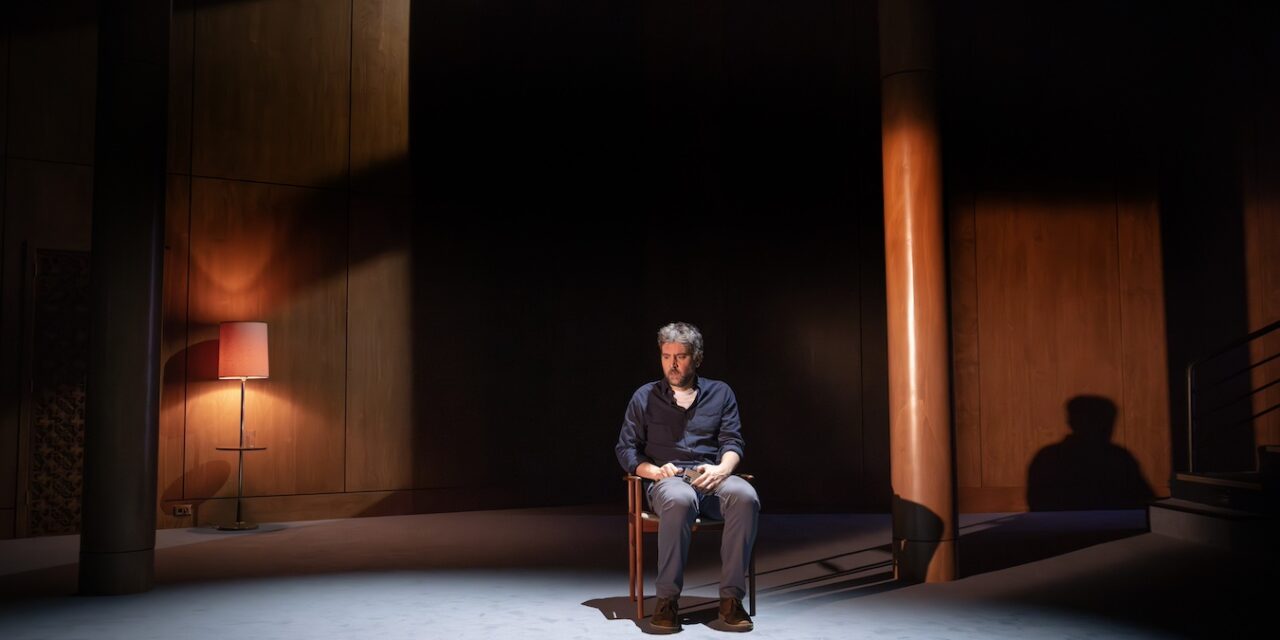Theater Review by Carol Rocamora . . . .
Since when can theater of ideas be as exciting and as powerful as, let’s say, a Beethoven symphony? When you emerge from a performance with the themes and motifs and strains spinning round and round in your head, playing not adagio or piano, but allegro and fortissimo?
Such is the experience I had while leaving the Public Theater where The Ally—Itamar Moses’s symphonic new play of ideas—opened tonight. Set in September/early October of 2023 on an American university campus, the empty stage is like an arena (a better metaphor for this play, perhaps) where the many urgent issues of today are proclaimed, debated, and rebutted.

Moses’s unnamed elitist university setting springs right from the pages of today’s headlines (and tomorrow’s, too, undoubtedly) where campus debates on urgent issues have heated past the boiling point, erupting into violence. The play is so sharply contemporary that it’s hard to believe it’s a script Moses has been working on for almost a decade (written before October 7, 2023, and the current Israel-Palestine war).
In The Ally, an adjunct professor named Asaf (Josh Radnor) is asked by Baron (Elijah Jones), one of his Black students, to sign a manifesto protesting the police shooting of Baron’s cousin. A Jewish liberal raised in Berkeley, now an instructor of playwriting/screenwriting, Asaf prides himself on his openminded views, and agrees to sign the manifesto, despite one clause in the twenty-page document that mentions apartheid and genocide in association with Israel. Next, he’s asked by two other students—an anti-Israel Jew and a Palestinian—to serve as a faculty sponsor for a lecture by a Jewish historian critical of Israel. “It’s complicated,” Asaf acknowledges. And yet, he agrees to this request, too.


What ensues is Asaf’s gradual meltdown, as his idealistic view of free, tolerant discourse in academia is challenged by everyone around him and throws him into a spiritual crisis. Each character in the play becomes a mouthpiece of an urgent issue of the day—including antisemitism, the Israel-Palestinian conflict, police brutality against Blacks, and Black hostility toward Jews—as well as related issues of academic advancement and campus-neighborhood relations. Rachel (Madeline Weinstein), a Jewish student and head of the newly formed JIT (Jews of Independent Thought), challenges Asaf’s support of Israel, presenting the point of view of many Jewish students on campuses today. Farid (Michael Khalid Karadsheh), a Palestinian student, joins her in the challenge, giving an anguished cry for Palestine. “You know nothing of our culture—its beauty, its variety, its depth!” Farid cries. Nakia (Cherise Boothe), a lawyer and Black campus militant (and former lover of Asaf) challenges Asaf for being too reasonable and for not taking sides. Reuven (Ben Rosenfield), a conservative pro-Israel graduate student, pleads with Asaf to withdraw his support for the manifesto and the controversial speaker. Their speeches are delivered in a passionate, debate-style fashion, provoking rebuttal from Asaf, whose resolve to listen to opposing points of view starts to weaken under the barrage of attacks.
What is unique about this play of ideas (directed by Lila Neugebauer) is its fair-mindedness in presenting so many conflicting points of view with equal weight and respect. (In this regard, Moses joins the ranks of George Bernard Shaw and Tom Stoppard, champions of theater of ideas.) Like his protagonist, the playwright Moses believes in the importance of listening to and considering different viewpoints. The character Asaf may be having a crisis of conviction—but not his creator.


The most stinging attack on Asaf finally comes from his own wife Gwen (Joy Osmanski), an East Asian administrator at the university in charge of community relations. Gwen begs Asaf to support her and join the protest march planned for Baron’s murdered cousin (because it will help advance her career). She makes this request in the name of love, and her accusation of his selfishness—namely, Asaf’s inability to see beyond his own point of view—hangs in the air.
In the play’s final scene, a quote from Rabbi Hillel (from the first century CE) offered by a new character (no spoiler), haunts Asaf: “If I am not for myself, who will be for me? If I am only for myself, what am I? And if not now, when?” The questions go unanswered at the play’s end.
A New York Times preview article reports the playwright as saying that the ending of the play has been changing during previews. Since when have we had a new play that is so acutely “in the moment”? And in the next moment, too . . .
The Ally. Through March 24 at The Public Theater (425 Lafayette, at Astor Place). www.publictheater.org
Photos: Joan Marcus
Cover Photo: Josh Radnor


















